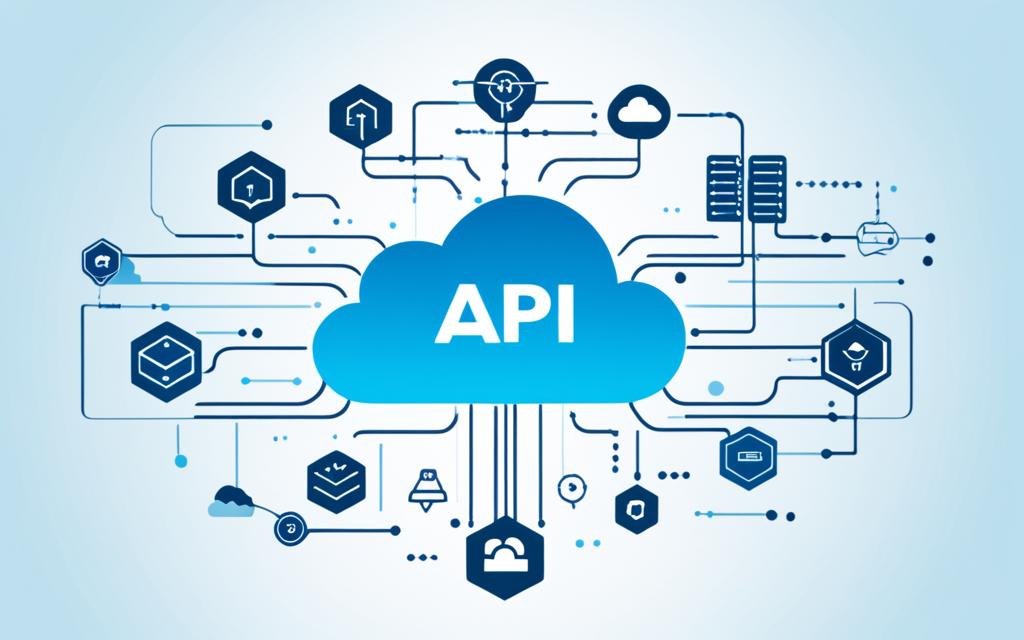Cloud API Management is a critical aspect of modern technology and business operations. It involves the design, development, testing, deployment, governance, security, monitoring, and monetization of APIs, facilitating their consumption and scalability. To effectively manage APIs and ensure their seamless integration into cloud networking environments, organizations require a robust API management platform.
One such platform is Google Cloud’s Apigee, a comprehensive API management solution that provides a wide array of tools and functionalities. With Apigee, businesses can streamline their API life cycle, enhance security measures, and optimize performance. This platform offers essential features, including developer portals, design and development capabilities, testing options, API gateways, analytics and monitoring functionalities, policy management tools, and security and governance measures.
To better understand the significance of API management and how it benefits organizations, let’s delve deeper into its definition, explore the advantages it offers, and take a closer look at the essential tools and features an API management platform should provide.
What is API Management?
APIs, or Application Programming Interfaces, are the foundational building blocks of technology and business infrastructure. They enable applications to seamlessly communicate with each other, facilitating connections between apps, apps and servers, and apps and consumers. With the rise of apps, software, and cloud computing, companies are managing a growing number of APIs. This is where API management comes in.
API management is a comprehensive process that involves developing, designing, monitoring, testing, securing, and analyzing APIs for organizations. It ensures that APIs are efficiently managed throughout their entire life cycle, from creation to retirement. To support this process, organizations utilize an API management platform—a powerful software solution that enables effective API management and helps organizations make their APIs consumable and scalable.
An API management platform provides organizations with the necessary tools, software, and processes to streamline API management and enhance the software development lifecycle. It offers a range of features and functionalities, including:
- Developer portals: A user-friendly interface for developers to explore, access, and utilize APIs.
- Design and development tools: Tools that facilitate the creation and modification of APIs, ensuring optimal design and performance.
- Testing capabilities: Tools and frameworks to conduct comprehensive testing of APIs, ensuring reliability and functionality.
- API gateways: A single entry point that manages API traffic, ensuring security, scalability, and performance.
- Analytics and monitoring functionalities: Tools for tracking, analyzing, and optimizing API performance, usage, and engagement.
- Policy management options: Tools to enforce and manage API usage policies, ensuring compliance and security.
- Security and governance measures: Features that safeguard APIs against threats, ensuring data privacy and security.
By utilizing an API management platform, organizations can effectively navigate the complex landscape of API management and unlock the full potential of their APIs. It enables them to optimize their software development lifecycle, streamline operations, enhance security, and deliver superior experiences to API consumers.
Benefits of API Management
API management platforms offer numerous benefits for organizations. They provide a centralized solution to manage APIs effectively, treating them like software products. This approach ensures security, performance optimization, and continuous improvement based on user feedback. Here are some key benefits of API management:
Multilayer Security and Privacy
API management platforms offer robust security measures to protect APIs and sensitive data. They implement multilayer security protocols, including access control, authentication, and encryption, safeguarding against unauthorized access and data breaches.
Easy Detection of API Anomalies
With the power of AI-powered automation, API management platforms enable easy detection of anomalies in API performance. By analyzing data in real-time, these platforms can identify and address issues promptly, ensuring smooth operation and enhanced user experience.
Global Reach through Cloud Hosting
API management platforms leverage cloud hosting capabilities, allowing organizations to easily scale and distribute their APIs globally. This ensures high availability and low latency, delivering a seamless experience to users across different regions.
Improved Performance and Reliability
API management platforms seamlessly integrate with other cloud services, enhancing performance and reliability. By leveraging features like caching and load balancing, organizations can optimize API response times and handle heavy traffic efficiently.
Unlocking Legacy Applications
API management platforms enable organizations to unlock the potential of their legacy applications. By exposing legacy functionalities through APIs, businesses can seamlessly connect them to modern systems and products, extending their lifespan and driving innovation.
Creation of New Business Channels
APIs contain valuable data and services that can be monetized. API management platforms facilitate the creation of new business channels by enabling organizations to expose and distribute APIs to external developers and partners. This opens up opportunities for collaboration, revenue generation, and the creation of innovative products and services.
API Monitoring and Analytics
API management platforms come equipped with comprehensive API monitoring and analytics tools. These tools capture and analyze data about API performance, usage metrics, and engagement, allowing organizations to gain valuable insights and optimize their APIs for maximum agility and performance. Key features of API monitoring tools include:
- Traffic analysis to identify patterns and trends in traffic sources
- API tracing and observability for real-time troubleshooting and monitoring
- Performance analysis to measure API response time and error count
- Availability and performance monitoring to track API uptime and performance
- Developer engagement tracking to analyze developer interactions with APIs
- Security monitoring to review API configurations and ensure compliance
By leveraging these monitoring and analytics capabilities, organizations can make data-driven decisions, optimize API performance, and drive business success.
API Management Tools
A comprehensive API management platform typically includes a range of tools to support the full life cycle of APIs. These tools play a crucial role in ensuring the successful design, development, testing, deployment, and governance of APIs. Let’s take a closer look at some of the key tools that are commonly found in API management platforms:
1. Developer Portals
Developer portals serve as a central hub for API developers, providing the necessary resources and documentation to facilitate API consumption. These portals offer developer-friendly interfaces, detailed API documentation, code samples, and interactive sandboxes that enable developers to quickly understand and integrate the APIs into their applications. They also provide tools for managing API keys, generating access tokens, and monitoring API usage.
2. Design and Development Tools
Design and development tools simplify the process of creating APIs by offering intuitive interfaces and code generation capabilities. These tools assist developers in defining API specifications, designing data models, and mapping endpoints. They also enable the creation of API schemas, message transformers, and request/response mappings, ensuring proper API structure and compatibility.
3. Testing
Testing tools are essential for ensuring the quality and reliability of APIs. They provide features for automated testing, unit testing, and integration testing, allowing developers to identify and rectify any issues before releasing the APIs to consumers. These tools enable the simulation of different scenarios, load testing, and performance testing to measure how well the APIs perform under various conditions.
4. API Gateways
API gateways act as intermediaries between API consumers and backend services. They provide a unified entry point for all API requests, enforcing security policies, rate limiting, and authentication mechanisms. API gateways offer features like request/response transformation, caching, traffic management, and logging. They ensure seamless communication between clients and servers, simplifying the orchestration of multiple APIs and securing data exchange.
5. Analytics and Monitoring
Analytics and monitoring tools provide valuable insights into API performance, usage patterns, and overall system health. These tools collect and analyze data related to API calls, endpoints, latency, error rates, and user engagement. They generate visualizations, dashboards, and reports, enabling API product managers and developers to make informed decisions and optimize API performance. By tracking metrics such as traffic volume, response times, and error rates, organizations can proactively identify issues and improve the overall user experience.
6. Policy Management
Policy management tools allow organizations to define and enforce API policies and rules. These tools enable the implementation of security measures, including authentication, authorization, and encryption. They also provide functionalities for managing API subscriptions, access controls, and usage limits. Policy management tools ensure compliance with regulatory requirements and protect sensitive data by applying fine-grained access controls.
7. Security and Governance
Security and governance tools are a critical component of API management platforms. These tools help organizations secure their APIs and protect against potential threats and vulnerabilities. They offer features such as threat detection, API key management, token validation, and SSL/TLS encryption. Security and governance tools ensure that APIs are compliant with industry standards, regulations, and data privacy laws.
By leveraging these API management tools, organizations can streamline the API life cycle, enhance developer experiences, and ensure the secure and efficient delivery of APIs to consumers.
API Monitoring and Analytics
Effective monitoring and analytics are essential for optimizing API performance and driving informed decision-making. API monitoring tools provide valuable insights into operational and business metrics, enabling organizations to enhance agility, maximize performance, and improve developer engagement. These tools offer several functionalities to support comprehensive evaluation and analysis of API performance and usage.
Traffic Analysis
One crucial function of API monitoring tools is traffic analysis, which allows organizations to identify patterns and trends in traffic sources and usage metrics. By analyzing the flow of API requests and responses, businesses can gain valuable insights into usage patterns, identify potential bottlenecks, and optimize API performance to meet user demands. Traffic analysis helps organizations understand how their APIs are being utilized and devise strategies for scaling and improving their API platforms.
API Tracing and Observability
API tracing and observability are vital for real-time monitoring and troubleshooting of API proxies. These tools enable organizations to gain visibility into API transactions and identify potential issues or bottlenecks that may impact API performance. By monitoring API proxies in real-time, organizations can proactively detect and address any anomalies, ensuring smooth and uninterrupted API operations.
Performance Analysis
API monitoring tools facilitate performance analysis by providing insights into crucial metrics such as API response time and error count. These metrics allow organizations to measure the speed and reliability of their APIs, identify areas for improvement, and optimize performance to enhance user experiences. Performance analysis helps organizations ensure that their APIs meet the predefined performance metrics and deliver on their intended functionalities.
Availability Monitoring
API availability monitoring is essential for tracking the uptime and accessibility of APIs across the value chain. By monitoring API availability, organizations can identify any instances of downtime, latency, or service disruptions and take immediate action to resolve these issues. Availability monitoring ensures that APIs are consistently accessible and that users can rely on their availability when accessing critical services and functionalities.
Developer Engagement Tracking
API monitoring tools also provide insights into developer engagement by analyzing how developers interact with APIs. These tools track metrics such as API usage patterns, developer adoption rates, and feedback, enabling organizations to gauge developer satisfaction and engagement. By understanding how developers utilize APIs and addressing their needs and concerns, organizations can foster stronger developer relationships and drive developer productivity.
Security Monitoring
Ensuring the security of API configurations and compliance with security policies is paramount. API monitoring tools help organizations review API configurations, identify any security anomalies or vulnerabilities, and ensure adherence to security guidelines. By monitoring API security, organizations can proactively identify and address potential security risks, safeguard their systems and data, and maintain compliance with regulatory requirements.
API monitoring and analytics are integral to the success of API management. These tools provide organizations with the necessary insights to optimize API performance, enhance developer engagement, and drive business growth. By leveraging API monitoring tools, businesses can make data-driven decisions, improve operational efficiency, and deliver exceptional user experiences.

Google Cloud’s Apigee API Management Platform
Google Cloud offers Apigee, a comprehensive API management platform that enables businesses to build, manage, analyze, scale, and secure their API ecosystems. With Apigee, organizations can benefit from a fully managed, scalable, secure, and high-performance API management solution.
Apigee supports various architectural styles like REST, SOAP, GraphQL, or gRPC, allowing businesses to choose the approach that best suits their needs. It offers automated controls powered by AI and ML to build and secure APIs efficiently, saving time and resources.
One of the notable features of Apigee is the use of Duet AI in Apigee API Management, which leverages natural language processing to help create API specifications. This ensures clear and concise communication between API developers and stakeholders.
Ensuring the security of APIs is of paramount importance, and Apigee provides automated API security with machine learning-based abuse detection. This proactive approach helps detect and mitigate potential threats, ensuring that APIs and the sensitive data they handle remain secure.
To optimize traffic flow and improve performance, Apigee offers high-performance API proxies for effective traffic management. This feature ensures that API requests are handled efficiently, resulting in faster response times and optimal user experiences.
Another advantage of Apigee is its flexibility in deployment options. It supports hybrid and multicloud deployments, allowing organizations to leverage their existing infrastructure while adopting newer cloud technologies. This flexibility enables seamless integration and scalability for API ecosystems.
Apigee also provides robust traffic management and control policies. With these policies, organizations can efficiently manage API traffic, set usage limits, and implement governance rules to ensure adherence to security and compliance standards.
Developer portals integrated into the API life cycle are essential for fostering developer engagement and collaboration. Apigee offers developer portals that empower API developers to document, test, and consume APIs efficiently, promoting seamless integration and collaboration.
Comprehensive analytics are crucial for monitoring and optimizing API performance. Apigee provides built-in and customizable API analytics dashboards that enable organizations to gain valuable insights into API usage, performance, and engagement metrics. Near-real-time API monitoring capabilities ensure that organizations can proactively identify and address any anomalies that may arise.
Furthermore, Apigee offers API monetization capabilities, allowing businesses to unlock additional value from their APIs. With the ability to securely monetize APIs, organizations can create new business channels and revenue streams.
In summary, Google Cloud’s Apigee API management platform combines robust features such as automated controls, AI-powered security, high-performance proxies, flexible deployment options, traffic management policies, developer portals, comprehensive analytics, near-real-time monitoring, and API monetization capabilities. With Apigee, organizations can effectively manage and optimize their API ecosystems, ensuring scalability, security, and superior performance.
Microsoft Azure API Management
Microsoft Azure provides a robust solution for API management with Azure API Management. This powerful platform enables organizations to efficiently manage their APIs across various cloud environments and on-premises, ensuring optimized API traffic flow and maintaining security and compliance.
Azure API Management offers a range of controls to manage data and service exposure, including authentication, authorization, and usage limits. By leveraging these controls, businesses can confidently protect their APIs and manage access for different user groups.
One of the key advantages of Azure API Management is its ability to facilitate faster app development and delivery of immediate value to customers. Through an API-first approach, organizations can build apps more efficiently using features like API mocking, revisions and versioning, and automated API documentation. With customizable developer portals, API discoverability is enhanced, making it easier for developers and businesses to find and leverage APIs.
Azure API Management also allows organizations to modernize their existing services by creating REST-based APIs that act as facades for backend services. This transformation enables smoother integration with cloud-native applications and streamlines the development process.
Security and compliance are critical considerations for any API management solution, and Azure API Management excels in this aspect. It offers comprehensive security measures, including ML-powered abuse detection and a dedicated team of security experts.
Furthermore, Azure API Management supports hybrid and multicloud deployments, giving organizations the flexibility to deploy APIs in any environment. This architectural freedom empowers businesses to leverage the benefits of different cloud providers and optimize their infrastructure for maximum efficiency.
To further enhance API management capabilities, Azure API Management includes traffic management and control policies, as well as robust API monitoring and analytics capabilities. These features enable organizations to gain valuable insights into API performance, usage metrics, and engagement, allowing for continuous optimization and informed decision-making.
Key Features of Microsoft Azure API Management
| Features | Description |
|---|---|
| API Mocking | Mimic API behavior for development and testing purposes. |
| Revisions and Versioning | Manage different versions of APIs to ensure compatibility and effective API lifecycle management. |
| Automated API Documentation | Generate comprehensive and up-to-date API documentation automatically. |
| Customizable Developer Portals | Create user-friendly portals for developers to explore and consume APIs. |
| Hybrid and Multicloud Deployments | Deploy APIs in diverse environments for maximum architectural flexibility. |
| Traffic Management and Control Policies | Configure policies to manage and control API traffic effectively. |
| API Monitoring and Analytics | Gather data and insights on API performance, usage metrics, and engagement for continuous optimization. |
| API Monetization | Explore monetization options by unlocking the value of APIs and offering premium services. |
Conclusion
API management is fundamental for organizations looking to optimize their cloud networking. By leveraging robust API management platforms like Google Cloud’s Apigee or Microsoft Azure’s API Management, businesses can streamline their operations, enhance performance, and ensure the security and scalability of their APIs.
These platforms offer a wide range of tools and features, including developer portals, design and development capabilities, testing options, API gateways, analytics and monitoring functionalities, policy management tools, and security and governance measures. With comprehensive API monitoring and analytics capabilities, organizations can gather valuable insights about API performance, usage metrics, and engagement, enabling them to make informed decisions and continuously improve their API ecosystem.
Whether it’s for cloud-native applications or integration with legacy systems, API management tools provide the necessary infrastructure to support API life cycles, improve developer experiences, and create new business channels.
FAQ
What is API management?
API management is the process of developing, designing, monitoring, testing, securing, and analyzing APIs for organizations. It involves the use of an API management platform, which provides the necessary software and processes to support the full life cycle of APIs and API consumers.
What are the benefits of API management?
API management platforms offer numerous benefits for organizations. Some of the key benefits include multilayer security and privacy, easy detection of API anomalies through AI-powered automation, global reach through cloud hosting, improved performance and reliability through integration with other cloud services, the ability to unlock legacy applications and connect them to new systems and products, and the creation of new business channels by monetizing valuable data and services through APIs.
What tools are included in an API management platform?
A comprehensive API management platform typically includes a range of tools to support the full life cycle of APIs. These tools include developer portals, design and development capabilities, testing options, API gateways, analytics and monitoring features, policy management tools, and security and governance functionalities.
What are API monitoring tools used for?
API monitoring tools are crucial for gathering and analyzing data about API performance. They enable comprehensive evaluation of the performance and usage metrics of APIs, API platforms, or entire API ecosystems. These tools provide insights to developers, API product managers, and business stakeholders, enabling maximum agility, performance optimization, and decision-making.
What features does Google Cloud’s Apigee API management platform offer?
Google Cloud’s Apigee is a comprehensive API management platform that enables businesses to build, manage, analyze, scale, and secure their API ecosystems. Apigee supports various architectural styles like REST, SOAP, GraphQL, or gRPC and offers automated controls powered by AI/ML to build and secure APIs. It provides flexibility in pricing options, allowing organizations to choose between pay-as-you-go or subscription models. Apigee’s features include automated API security with ML-based abuse detection, high-performance API proxies for traffic management, hybrid/multicloud deployment options, traffic management and control policies, developer portals integrated into the API life cycle, built-in and custom API analytics dashboards, near real-time API monitoring, and API monetization capabilities.
What does Microsoft Azure’s API management offer?
Microsoft Azure’s API Management allows organizations to manage APIs across clouds and on-premises, optimizing API traffic flow and ensuring security and compliance. It provides controls for data and service exposure through authentication, authorization, and usage limits. Azure API Management enables businesses to build apps faster and deliver immediate value to customers through API-first approaches, with features like API mocking, revisions and versioning, and automated API documentation. It also improves API discoverability through customizable developer portals. Azure API Management allows organizations to transform existing services into modern REST-based APIs by creating facades for back-end services. It offers comprehensive security and compliance measures, with ML-powered abuse detection and a dedicated team of security experts. Azure API Management supports hybrid and multicloud deployments, providing architectural freedom to deploy APIs in any environment. It also includes traffic management and control policies, API monitoring and analytics capabilities, and API monetization options.



















